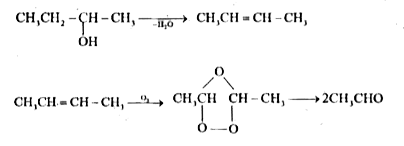An alkene, obtained by the dehydration of an alcohol, on ozonolysis gives acetaldehyde only as the product. The alcohol is:Solution in Malayalam
CH3CH2CH2OH
CH3CH2OH
CH3CH=CHCH2OH
CH3CH2C∣OHHCH3
The correct Answer is:D
Topper's Solved these Questions
- ALCOHOL, PHENOL & ETHER BOOK - BRILLIANT PUBLICATIONCHAPTER - ALCOHOL, PHENOL & ETHER EXERCISE - LEVEL II (ASSERTION - REASON TYPE)
40 Videos
- ALCOHOL, PHENOL & ETHER BOOK - BRILLIANT PUBLICATIONCHAPTER - ALCOHOL, PHENOL & ETHER EXERCISE - LEVEL II (ASSERTION - REASON TYPE)
40 Videos
- ALCOHOL PHENOL AND ETHERS BOOK - BRILLIANT PUBLICATIONCHAPTER - ALCOHOL PHENOL AND ETHERS EXERCISE - LEVEL-II
40 Videos
- ALCOHOLS, PHENOLS AND ETHERSBOOK - BRILLIANT PUBLICATIONCHAPTER - ALCOHOLS, PHENOLS AND ETHERSEXERCISE - LEVEL III (Linked Comprehension Type)
12 Videos
Similar Questions
Assertion : Carbon oxygen bond length of phenol is slightly less than that in methanol.
Reason : There exist a partial double bond character and carbon to which oxygen is attached in phenol is sp2 hybridised.
View SolutionAssertion : Carbon oxygen bond length of phenol is slightly less than that in methanol.
Reason : There exist a partial double bond character and carbon to which oxygen is attached in phenol is sp2 hybridised.
View SolutionNumber of 2∘ alcohols among the structural isomers of C5H12O is
View SolutionAn important route to unsymmetrical ethers is a nucleophilic substitution reaction known as the Williamson synthesis. This synthesis consists of an SN2 reaction of a sodium alkoxide with an alkyl halide, alkyl sulphonate or alkyl sulphate.
By a proper choice of reagents, both symmetrical and unsymmetrical ethers can be prepared by Williamson synthesis. The reverse process of cleavage of ethers to give back the original alkyl halide and the alcohol can be carried out by heating the ether with HI at 373 K.
Which of the following reagents when heated will give a good yield of ether?
View SolutionAn alkene obtained by the dehydration of an alcohol (A), on ozolysis gives two molecules of acetaldegyde for ever molecule of alkene. The alcohol (A) is
View SolutionAn alkene obtained by the dehydration of an alcohol (A), on ozolysis gives two molecules of acetaldegyde for ever molecule of alkene. The alcohol (A) is
View SolutionAn alcohol C_4H_9OH on dehydration gives an alkene, which on oxidation yield a acetone. The alcohol is
View SolutionAn alekene X is obtained by dehydration of ann alcohol Y. X on ozonolysis gives two molecules of ethanal for every molecule of alkene. X and Y are
View SolutionAn alkene on ozonolysis gives two molecules of acetaldehyde . The alkene is -
View SolutionAn alcohol, on dehydration produces an alkene which on ozonolysis yields two molecules of ethanal. The alcohol is, therefore.
View SolutionDehydration of alcohols to give alkenes is catalysed by :
View SolutionAn alkene on ozonolysis gives acetaldehyde and acetone. The alkene in question is
View Solution0.037 g of an alcohol was added to methyl magnesium iodide and the gas evolved at STP, occupies the volume 11.2 cm^(3) . On dehydration, the alcohol gives an alkene. The alkene upon ozonolysis produces acetone as one of its products. The alcohol gives the carboxylic acid upon oxidation with same number of carbon atom. The alcohol is ...
View SolutionAn alekene X is obtained by dehydration of ann alcohol Y. X on ozonolysis gives two molecules of ethanal for every molecule of alkene. X and Y are
View SolutionDehydration of alcohols to give alkenes is catalysed by :
View Solution

